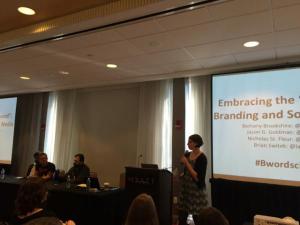By Kate Greene
In her opening remarks as moderator of the panel “Embrace the B word: Branding and Social Media,” Bethany Brookshire, staff education writer at Science News for Students and writer at Science News, warned attendees that they wouldn’t be getting a crash course in gaining Twitter followers.
Instead, she and panelists would lead a kind of Socratic dialogue with the goal of teasing out the thorny definitions of words like “brand,” “beat,” and “self-promotion.”“What does it mean to have a brand and use it?” Brookshire, who goes by @scicurious on Twitter, asked in her introduction. “And what does it mean as social media has come to the fore?” Brookshire and her panel of science writers Jason G. Goldman, freelance science writer at Scientific American and others; Nicholas St. Fleur, science journalist at the New York Times; and Brian Switek, dinosaur expert, author and National Geographic blogger, hoped to help attendees find their ways through these questions.
To kick off the discussion, attendees were presented with slides of well-known, Twitter-famous science writers. “What’s in a brand? Shout words that come to mind,” Brookshire prompted.
“Poison!”
“Chemistry!”
“Integrity!”
The science writer pictured was Deborah Blum, author of the Poisoner’s Handbook and director of the Knight Science Journalism program at MIT. Blum had supplied her own ideas of her brand as well: poison, everyday science, history, narrative, integrity. Clearly she had, through her professional presentation and work, impressed her interests and approach on attendees, with some additions and expansions.
In the following slides, science writers Brian Switek, David Shiffman, and Ed Yong were also easily matched with their own self-descriptions of their brands. These science writers, too, defined their own brands more broadly, and in some cases, more specifically. While Switek is a dinosaur expert, he also includes natural history and cats in his brand. Yong, known for his irreverent tone and prodigious output of stories about biology and nature, claimed part of his brand was also “F---ers are just going to say ‘duck sex,’ why did I even agree to this?” Even within his own definition of his brand, Yong’s tone was on brand.
Next, the panelists provided working definitions (definitions below) of “brand,” “beat,” and “self-promotion.” And then the main event: the “unpanel.” In this case, the unpanel was be a large-group exercise where attendees would move to a side of the room based on their agreement or disagreement with an idea. Panelists would kick off the discussions with succinct defense of a pro or con position, and attendees would follow.
- “Personal branding is ruining journalism.”
- “Branding and self-promotion are the same thing.”
- “A brand and a beat are the same thing.”
- “A brand is under your control.”
- “A brand is more important to your colleagues than to the public.”
- “Constructing a brand requires being active on social media.”
- “My opinion about brands has changed over the last hour.”
For the first few prompts, attendees mostly gathered on the con side of the room. Still, there were enough pros so that opinions flew and discussions emerged. As the exercise continued, members of the pro sides grew. It was almost as if disagreements on Twitter were being re-enacted in real time. Except in the Charles View Ballroom at the top of the Hyatt, on this day, everyone was civil and respectful.
Donald Trump was invoked by a handful of people who described him as style without substance, a brand but nothing to back it up. Attendees wanted to distinguish the work and a quality, consistent product from the brand while acknowledging that brands are still important to be consider and require management.
“I feel like if you do the hard work and you build it, your brand will come,” St. Fleur said.
It can be a natural side effect of covering a beat that it becomes your brand, some attendees noted, and a brand that’s recognized by your colleagues is useful for getting work. At the same time, attendees acknowledged that the average reader of your stories isn’t familiar with your brand as it appears on your Twitter bio.
One attendee said that as a fact checker, she got her reputation by going to conferences and meeting people face-to-face. Twitter had nothing to do with it, she said. Another added: “Before this hour, I didn’t feel like that old a guy.”
Toward the end, one attendee confessed, “I was on the fence when I came in,” she said. “Now I’m on the fence but clarifying my position.”
“Your brand is as good as your product. Focus on your product,” she continued. “What does the word ‘brand’ add to this discussion that ‘work’ doesn’t?”
You can follow the discussion as it appeared on Twitter by searching for #Bwordsciwri.
Definitions
- Brand: The ongoing process of establishing a prescribed image or impression in the mind of others about an individual, group or organization. Colloquially: Forming an association between yourself and your beat for the purpose of getting more work.
- Beat: In depth reporting on a particular issue. Colloquially: The topics you cover regularly, that you hopefully gain more knowledge about.
- Self-promotion: The act of bringing attention to oneself or one’s work. Colloquially: Vainglorious boasting, looking like total tool. Not-so-humblebrag.

